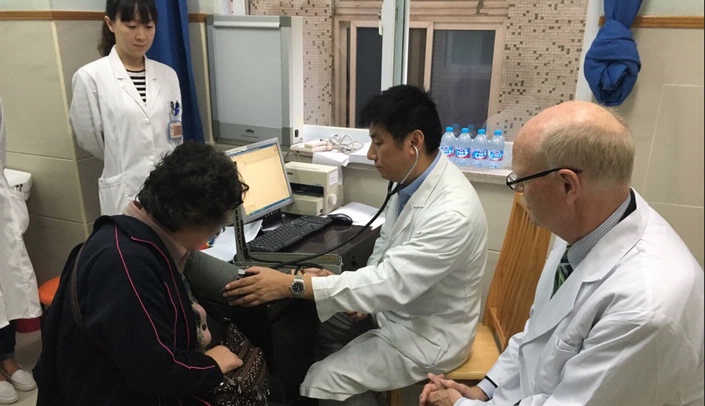October is a hectic month at UNMC. Students face midterms, faculty have grading and grant applications, some staff are busy recruiting next year’s students. For a few faculty and administrators at UNMC, October means trips to China.
This series of articles discusses key elements of these trips. This article is about our partnerships with universities and hospitals in China. The first and second articles, on recruitment and education, were published earlier.
UNMC’s mission is to lead the world in transforming lives for a healthy future, and one way it does so is by partnering with institutions in Nebraska, the United States, and around the world. Doing so enables us to improve clinical care, education, and research at UNMC and our partners. It may sound cliché, but we are stronger together.
Even in this age of advanced communications, travel is required to maintain UNMC’s relationships with current partners and build connections with new ones. That is why UNMC’s delegations to its Chinese partners are so important.
University collaborations expand research and student exchange opportunities
This October, leadership and faculty from UNMC visited some of our closest university collaborators, such as Shanghai Jiao Tong University, Tongji University, and the Shanghai University of Medicine and Health Sciences.
A delegation from UNMC visited one of our newest partners, Capital Medical University (CMU), where they discussed medical and nursing student exchange programs. This fledgling partnership has already brought medical students from CMU to UNMC in the spring of 2016 (more about this here and here). Leaders at both universities would like to expand the exchange program to include nursing students and UNMC students going to CMU. Additionally, they talked about a program in Public Health where students from CMU travel to UNMC to study and receive a certificate in public health after a year of study.
Clinical collaborations extend family medicine education and patient care to China
UNMC faculty and leaders also visited clinical collaborators such as Tongji Hospital, Shanghai First Maternity and Infant Hospital, West China Rehabilitation Hospital, and Shanghai Traditional Medicine Hospital.
A delegation from UNMC’s Family Medicine department visited Yangpu Hospital and East Hospital in Shanghai.
At Yangpu Hospital, the delegation worked with physicians who had completed the annual Family Medicine Leadership course to provide care to ambulatory patients. Jeffrey Harrison, M.D., vice chairperson for the Department of Family Medicine said, "The new family medicine clinic at Yangpu Hospital is operated closer to the way we deliver care in the U.S., with more time for each patient to address the multiple issues they are dealing with, such as hypertension, coronary artery disease, and type 2 diabetes, just to name a few. These are medical issues very similar to ones we see in our own patients. The opportunity to provide direct patient care and help educate our past learners was one of the trip highlights."
At East Hospital the delegation provided consultation and education on a complex patient with the Family Medicine teaching service. "We were able to discuss how we would approach our medical decision making and care recommendations. We were also able to demonstrate how we provide clinical education and feedback to our learners. This was a highly enjoyable activity that revealed how we manage many patients with similar health issues," Harrison said.
UNMC’s College of Allied Health Professions forms new partnerships
Leadership from UNMC’s College of Allied Health Professions forged new connections during their time in China. They traveled to Nanjing (about 300 km northwest of Shanghai) and Chengdu (in central China, where the giant pandas are) to sign agreements with Nanjing Medical University and West China Hospital at Sichuan University.
Both universities have existing physical therapy education programs at the bachelor level. Additionally, physical therapy faculty from UNMC’s CAHP have visited both before and were impressed by their programs and faculty, said Kyle Meyer, Ph.D., dean of the College of Allied Health Professions.
"The UNMC physical therapy program has partnered with the Chinese Scholarship Council since 2011 to accept students from universities in China into the UNMC DPT program, with the goal of preparing practitioners and faculty to return to China to help grow a much needed physical therapy workforce," said Meyer. "UNMC is working collaboratively with several universities in China to support the advancement of the profession of physical therapy in China. The new partnerships with Nanjing and Sichuan Universities expand this network and allow for further opportunities for student and faculty exchanges."
